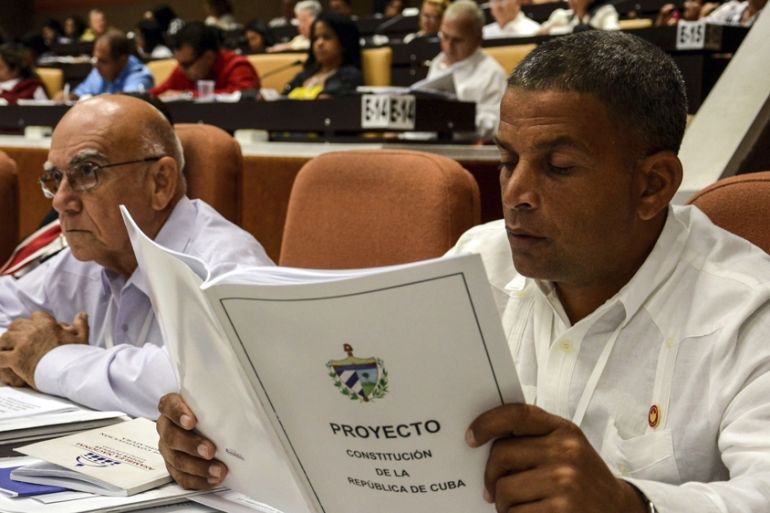Cuba’s draft constitution omits the aim of building communism
A draft of Cuba’s new constitution recognises private property and opens the door to gay marriage.

A draft of Cuba‘s new constitution omits the aim of building communism, although it keeps the Communist Party as the guiding force of the one-party system, as well as recognising private property and opening the door to gay marriage.
Cuba’s national assembly in the capital, Havana, is debating this weekend a draft of the document to replace its current constitution, reflecting political, social and economic changes.
Once lawmakers have approved the draft, it will be submitted to a popular consultation. The final document, which could include changes, will then be put to a national referendum.
The current draft omits a clause in the 1976 constitution on the ultimate aim of building a “communist society”, instead simply focusing on socialism.
“This does not mean we are renouncing our ideas,” Esteban Lazo, president of the National Assembly, was quoted as saying by state-run media.
Cuba had simply moved into a different era following the fall of the Soviet Union, he added.
Carlos Alzugaray, former Cuba ambassador to the European Union and professor at the University of Havana, described the developments as “a positive step”.
“Change is important on everything that refers to the Cuban constitutional order … but now we will need a broad legislative agenda, so these laws are properly executed,” he told Al Jazeera from the Cuban capital.
“We will have to see what comes out of all this discussion.”
PM post created
The draft also appears to strengthen political institutions and create a more collective leadership structure, after nearly 60 years of rule by late revolutionary leader Fidel Castro and his younger brother, Raul.
Raul Castro was replaced by Miguel Diaz-Canel in April, although he remains head of the Communist Party until 2021. He also heads the constitutional reform commission.
Under the proposed constitution, the president will no longer be the head of the council of state and council of ministers.
Instead, it creates the position of prime minister and designates the president of the assembly also as head of the council of state, Cuba’s highest executive body.
One of the other top items at Saturday’s assembly was the recognition in the draft constitution of marriage as between two individuals rather than a man and a wife.
“We are not the first, nor would we be the vanguard in this matter … there are around 24 countries that have this concept incorporated, we could not turn our back on this issue when preparing a new constitutional project,” said Homero Acosta, the secretary of the council of state.
‘Continuity and change’
The draft also sets an age and term limits for presidents, stating they must be under 60 when they first take office and can carry out no more than two consecutive five-year terms.
“We are experiencing a process of continuity and change,” Alzugaray, the professor in Havana, said.
“Cuba will maintain its fundamental principles, those that were established after the revolution, but at the same time, a change is taking place.
“Also, the way this has been handled has been extremely democratic. We are watching live the debate in the National Assembly, we are listening to all the deputies as they explain their reasons, and the document will be transferred to the citizens, so they can discuss it.
“This is a process of democratic deliberation that is rare in the world,” he added.
|
|
Reflecting the gradual generational transition in Cuba’s leadership, Diaz-Canel named his cabinet at the start of the assembly meeting on Saturday, promoting two officials in their 50s to become vice presidents alongside two sitting octogenarians and a septuagenarian.
The new president kept a majority of ministers from Castro, including in the key posts of defence, interior, trade and foreign relations, in line with his April promise to provide continuity.
Marino Murillo, the head of the Communist Party’s reform commission and previously one of the council of ministers’ vice presidents, was the only top figure omitted from the new line-up.
Under Castro, Murillo spearheaded changes to the state-run economy and he remains head of the Party’s reform commission and a member of the political bureau.
The reforms have slowed however in recent years amid fears they have allowed some Cubans to enrich themselves, fostering inequality, and weakened the control of the state.
This month, Cuba issued regulations tightening control of the private sector and limiting business licenses to one per person.